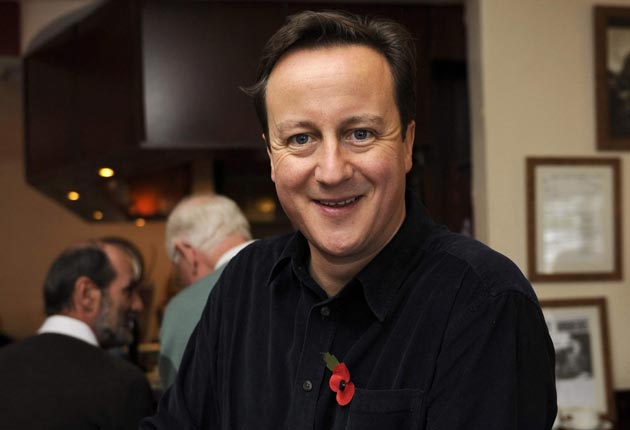Andrew Grice: Why Cameron can afford to relax as his rivals vie for the fairness vote
Inside Politics

Mirror mirror on the wall, who is the fairest of us all?
That's what Nick Clegg and Ed Miliband are asking as they join battle for the "progressive vote".
With the Liberal Democrats locked in embrace with the Conservatives, Labour's pitch is obvious: we are the only progressive party now. Quite a lot of those who have abandoned the Liberal Democrats since voting for them in May will never forgive Mr Clegg for forming the Coalition. But he hopes to woo back another group of "softer" disaffected Liberal Democrats and needs to find new recruits if his party is to avoid the meltdown at the next election that some of his MPs and activists fear.
So in his Hugo Young Lecture on Tuesday, Mr Clegg took the fight to Labour, branding it "old progressive" under its new leadership. No prizes for guessing who the "new progressives" are. The Liberal Democrats, of course.
Mr Clegg argued: "For old progressives, reducing snapshot income inequality is the ultimate goal. For new progressives, reducing the barriers to [social] mobility is." He accused the "old" group of believing in a state-knows-best approach, while the "new" one favours people power and believes that what matters is how money is spent rather than how much. "Poverty is about the quality of the local school, access to good health services and fear of crime," he said.
To some extent, Mr Clegg is making a virtue out of necessity. The Coalition doesn't have the money to spray around that Labour enjoyed in the Blair-Brown years. It is committed, on paper, to ending child poverty but I doubt very much it will find the £13bn the Treasury calculates it would cost to achieve the goal first set by Labour. "It's much harder to be progressive under pressure," one Clegg ally said. The Deputy Prime Minister argued that it can be done – and indeed was done in the spending review through his £2.5bn "pupil premium" for children from disadvantaged backgrounds.
So far, so good. But there were a few missing pieces in the Clegg jigsaw. Funnily enough, he didn't mention how the inequality gap widened during the Thatcher era. I can see why David Cameron didn't go there when he gave the same lecture a year ago, but surely it didn't need have to be off limits for the Liberal Democrats.
Then there's the time-lag problem. Answering questions after his speech, he acknowledged how difficult – and slow – it was to measure progress on social mobility. There may be little or nothing to shout about by the 2015 election.
"Poverty plus a pound does not equal fairness," Mr Clegg insisted. Yet his critics point to evidence that countries with high levels of social mobility – such as Sweden, Denmark, Finland and Canada – have less inequality, while others such as the United States and Britain, with high levels of inequality, have low levels of mobility.
Mr Clegg is convinced the Coalition's plans for higher education funding will eventually improve social mobility, since universities will have to open their doors to more pupils from poor families before they can charge more than £6,000 a year in tuition fees. Many years from now, he might be proved right – although the £9,000 maximum fees from 2012 will surely deter some of the very students he wants to attract.
Before selling the policy to the public, Mr Clegg's immediate problem is persuading his own party to swallow it. How he must wish he was not starting from here. In isolation, the scheme might be sellable. But the Liberal Democrats have gone from a pledge to phase out fees to almost trebling them in six months.
Mr Clegg's most direct attack on Mr Miliband was over his plan to keep the new 50p rate of income tax on earnings over £150,000. Yesterday the Labour leader said it was about fairness as well as cutting the deficit – even though it won't bring in much revenue and is largely symbolic. Mr Clegg, who conveniently forgot that his own party was committed to a 50p rate up to and including the 2005 election, said the issue was a "shibboleth" compared to the big tax questions such as the Liberal Democrats' plans to raise personal tax allowances and capital gains tax. "Ed would rather have a pissing match in the corner of the room about 50p," one Clegg aide said.
In a speech today, Mr Miliband will start to reveal how he will try to win the "fairness" contest by appealing to the "squeezed middle" with whom Labour lost touch while in office. Let's hope he can define the group better than he did in an unconvincing BBC Radio 4 interview yesterday, for which he seemed curiously unprepared.
Although some people in both parties keep communication channels open in the hope of forging a Lib-Lab alliance after the next election, it seems a distant prospect. Clegg allies want Mr Miliband to drop his public demand that Mr Clegg would have to stand down in such circumstances. There is little sign of it. Recalling Mr Clegg's ultimatum during this year's post-election negotiations, Mr Miliband's dismissive response to a senior Liberal Democrat was: "You said it about Gordon!" As the two self-styled progressive parties fight it out, the only winner may be Mr Cameron.
Join our commenting forum
Join thought-provoking conversations, follow other Independent readers and see their replies
Comments